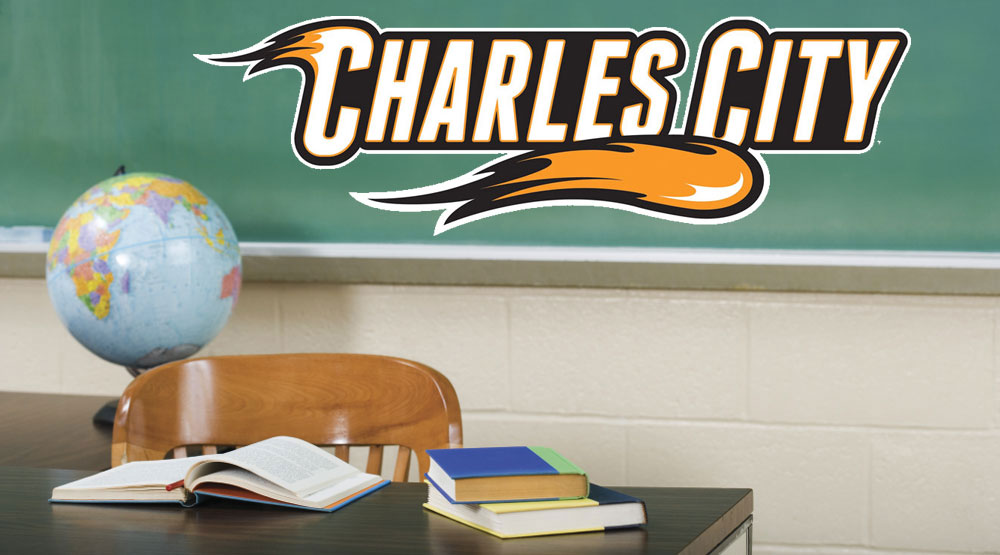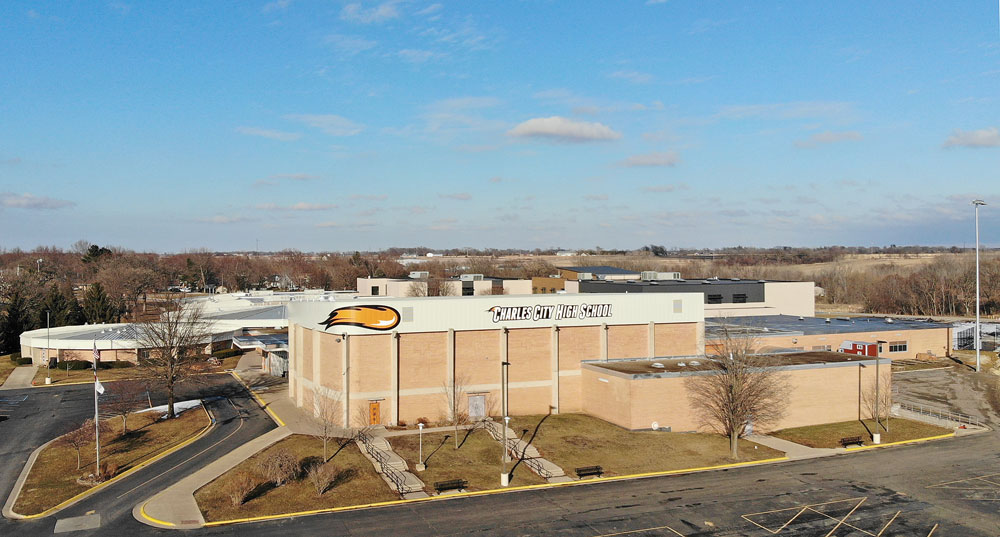Charles City High School pushes student job-learning options to businesses

By Bob Steenson, bsteenson@charlescitypress.com
One of the big goals that the Charles City School District has for its high school students is to give them some of their education outside the high school building.
More than 40 people representing community businesses, organizations and those who were just personally interested sat down to lunch last week and then heard a presentation from a couple of high school teachers and the principal about ways the school is trying to give students real-world experience.
“It’s very much a shift toward the real world,” said High School Principal Bryan Jurrens.
“It’s getting kids doing rather than talking about. I’ve heard for a long time, since I’ve been here, that our community wants this. And we know it works best. It was really just a matter of taking the time to get the systems aligned so that we have the capacity,” he said.
“And our students are ready for it, too,” he added.
The “Lunch & Learn” meeting at the public library was catered by students from the Comet Cafe, which was held up as one example of students learning skills and having a chance to put them into practice.
Jurrens said the school system needs to create partnerships with businesses and organizations.
“We need them to help us. We can’t do any of that without help, because we can’t replicate in the classroom what happens on the job,” he said.
Jurrens said when he has conversations with businesses about on-site work experience, “it’s kind of a new thing. It’s one of those scary things.”
The school is looking for opportunities for students to do more than just busy work on the job, but businesses are worried about liability if they have students actually involved in the work that the business does.
“We’re working on that exact solution right now with our insurance as a district,” Jurrens said.
“We want this to work. This is what’s best for our kids, what’s best for the future of our schools. This is what’s best for our future employees, right? We need them to get those opportunities,” he said.
He said the district had been hearing from graduates that they were lacking basic jobs skills when they graduated. And kids who were going on to college were needing to take remedial classes in some areas.
“A lot of our college-bound kids were really struggling,” he said. “So it showed us right there we had a problem we needed to address.”
Jurrens said an examination of grade level curriculum showed they were teaching some things in ninth grade that should be taught in sixth, seventh or eighth grade.
“That’s a problem,” he said. “We needed to fix that. We fixed that.”
Jurrens said they spent a lot of time on the sequencing of the coursework, to begin offering opportunities to explore or to do things in the workplace before the senior year, so that sophomores or even freshmen can start to pick and refine what their interests are.
For the college-bound students, they have started offering advanced placement (AP) courses as early as the freshman year, also.
“That’s that habit piece. We want you to start to build that habit early. We want you to start to have that work ethic that’s going to help you get through and be successful later on,” he said about the students.
The district is also putting a greater emphasis on intervention.
“We’ve made some big transitions, we’ve had to come up with some supports. We’ve started this year, there’s a 30-minute chunk set during the day just for intervention, purely for academic health, because our students, as we start to revamp, we need to support them in the same place,” Jurrens said.
As part of the luncheon, business teacher Tammy Wheeler talked about the CAPS program – that stands for Center for Advanced Professional Study.
“How can we help our students develop skills that the traditional classroom experience doesn’t address?” she asked.
“CAPS is the answer,” she said.
“What it is is a partnership between education, businesses, organizations and it takes students out of the classroom and integrates them fully into real world projects with people like you, the Charles City Community and businesses in the community,” Wheeler said.
“It’s very career-oriented. It’s not just necessarily on-the-job-training or work experience, but it’s actually doing real projects with real businesses in the community,” she said.
A lot of time is spent teaching the students professional skills, such as how to send a message, how to dress, how to talk, she said.
CAPS works with businesses to identify problems that they need to get done and then finds students with an interest in that area to tackle it. The top two CAPS skills for students are a customer obsession and being a self-driven learner, Wheeler said.
The program looks for real problems or tasks that the student can handle that will really benefit the business, she said.
“We’re not looking for a handout, we’re looking for a handshake,” she said.
Jurrens said CAPS is not necessarily about teaching workforce skills, but is more career oriented, and works well for students on a college course.
Wheeler urged any business owner who has a problem a student might be able to work on – or who would like to talk over potential CAPS ideas – to contact her.
The other presenter was Bret Spurgin, ag education teacher and FFA advisor, who talked about work-based learning where students actually go into the workplace and do a job.
“They’re out there getting credit and this is where they can get paid. If you’re over 16 in Iowa, students can get high school credit and also be paid for the work,” he said.
“They’re learning real skills, and also helping you in your work. And maybe after they graduate they come back to work for you, or go to a two-year program then come back to work for you.”
Spurgin said currently three students are involved on sort of a pilot program, working at L&J Industries, Mike Molstead Motors and Synergy.
Jurrens said it is kind of like student teaching.
“We’ve worked on some of these skills, we want them to go work and actually do the actual job,” he said. “We want them to be there just like it’s one of your employees. The whole goal behind it is you as an employer might say, hey, this is somebody we want to keep on staff.”
Or, the business might also go back to Spurgin and say the students needs to work on these particular skills, or needs to get better at something.
“Because those are all the learning experiences that we can’t do at the high school,” Jurrens said.
Jurrens said the main purpose of the luncheon was to introduce business owners and others to the opportunities that the programs offer, to the students and to the businesses, and hopefully spur some conversations with businesses about how they might get involved.









Social Share